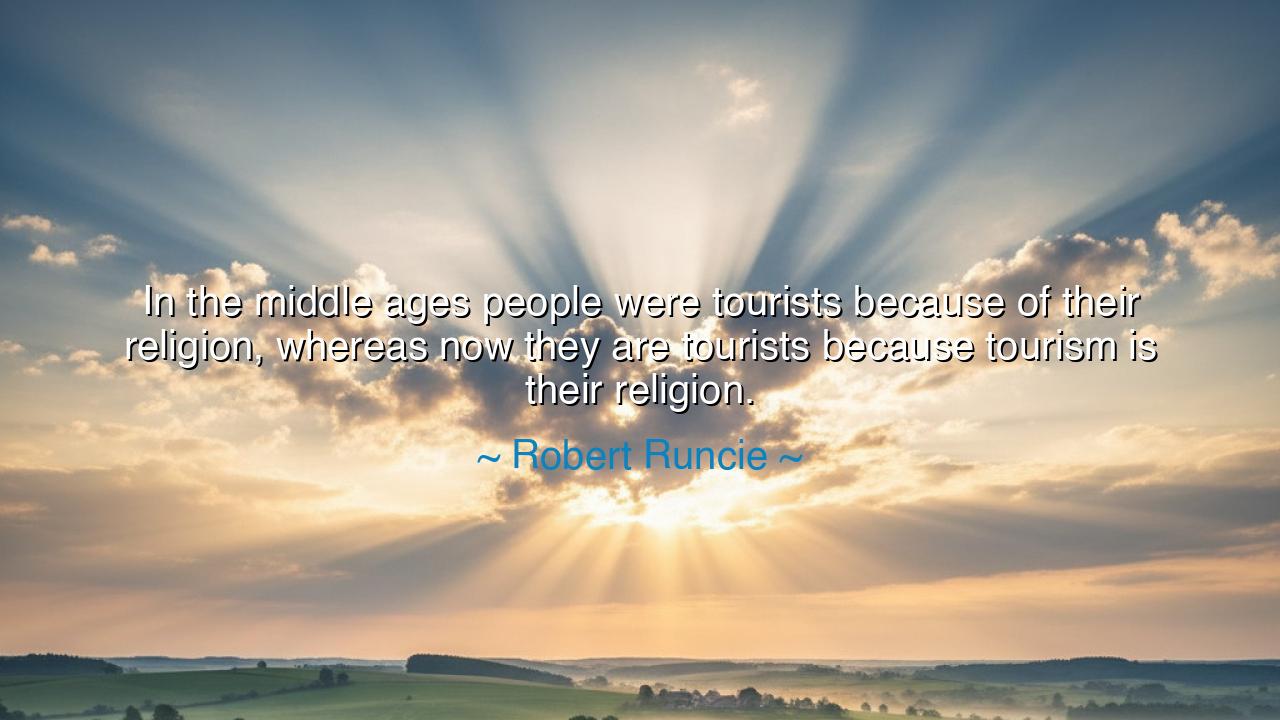
In the middle ages people were tourists because of their
In the middle ages people were tourists because of their religion, whereas now they are tourists because tourism is their religion.






Hear now, O seekers of wisdom, the profound words of Robert Runcie: "In the Middle Ages, people were tourists because of their religion, whereas now they are tourists because tourism is their religion." These words paint a powerful picture of how the essence of the human journey has shifted through the centuries. In the Middle Ages, travel was driven by faith, a pilgrimage to sacred sites, a journey that sought not merely the exploration of land but the search for spiritual salvation. Today, however, tourism has become a pursuit in its own right, a quest for novelty and experience, no longer tied to religious purpose but rather to a longing for pleasure and escape.
In ancient times, religion was not just a matter of belief but a journey—a pilgrimage undertaken with reverence, guided by deep spiritual conviction. The pilgrims of the Middle Ages set out from their homes with purpose, seeking not only to see the world but to encounter the divine in places of sacred significance. Jerusalem, Rome, and Santiago de Compostela were not just destinations, but holy grounds, where one could seek forgiveness, enlightenment, and connection with the divine. Their journey was sacred, their steps filled with meaning and devotion. The medieval pilgrimage was a spiritual act, one that demanded not only travel but a deep commitment to the sacred path.
Similarly, in ancient Greece, the concept of journey was intertwined with the search for wisdom. The oracle of Delphi, considered the center of the world by the Greeks, drew travelers from far and wide. These seekers were not simply travelers in the modern sense, but pilgrims of the soul, seeking answers to life’s deepest questions. Herodotus, the ancient historian, documented these journeys, and the Greek temples were not only places of worship but destinations for those wishing to find truth through personal reflection and divine guidance. Travel in these times was an act of spiritual awakening—a movement toward higher knowledge and understanding.
However, in today’s world, tourism has undergone a profound transformation. What was once a journey for meaning has become a pursuit of pleasure and entertainment. Modern tourists seek not spiritual enlightenment but fleeting experiences—a chance to escape the mundane, to see the wonders of the world with no greater purpose than to say they have seen them. The temples and cathedrals of the past have been replaced by vacation resorts, beach holidays, and adventure travel. What was once a religious or spiritual pilgrimage has, in many ways, become a secular quest, driven by the desire for new experiences and memories rather than inner transformation or divine connection.
Consider the modern-day tourists who flock to Paris, Rome, or the Great Wall of China. These places are revered not as sites of spiritual power but as icons of culture and human achievement. Their significance is historical, not sacred, and yet, they attract millions seeking to feel a connection to something greater than themselves. But this connection is no longer a spiritual one—it is romanticized and commodified, distilled into snapshots and Instagram posts. The authenticity of a journey, once rooted in religious or cultural purpose, is now measured by the novelty of experience, the comfort of luxury, and the pursuit of pleasure.
The lesson of Runcie’s words is not a rejection of travel or tourism, but a call to reflection—to consider why we journey and what we seek. In the Middle Ages, people traveled with purpose; they sought to connect with something greater than themselves. Today, we are still on a journey, but we must ask ourselves: what are we seeking? Are we traveling to find meaning, to grow spiritually, to connect with the divine? Or are we simply looking for experiences that offer us momentary pleasure and temporary satisfaction?
In your own life, O seekers, consider the purpose behind your journey. When you embark on a trip, ask yourself what you are truly seeking. Is it escape from your daily routine, or is it an opportunity to deepen your connection with the world, to understand the truths that bind us all? Let each step you take be a meaningful one, whether you are journeying to a distant land or exploring your own soul. Travel with the intention to learn, to grow, and to become more aware of the beauty and depth of the world around you. Tourism may be a pursuit of pleasure, but let your journey always be one of purpose, grounded in the quest for deeper understanding and wisdom.
So, O seekers, may your journey be guided by more than just the desire to see, but by the yearning to understand, to connect, and to live with a deeper sense of meaning. For in this, you will find not only the world around you, but also the truth within yourself.






AAdministratorAdministrator
Welcome, honored guests. Please leave a comment, we will respond soon